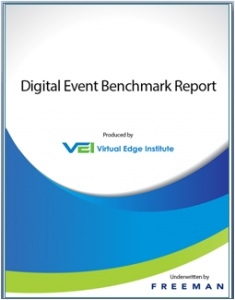Digital Event Benchmark Report Reveals Online Event Attendance Increase

Released last month, the Digital Event Benchmark Report, conducted by Virtual Edge Institute (VEI) and commissioned by Freeman, gives insight into how some organizations are using online events to reach their audiences.
The study included a cross-section of the event industry with representation from associations, corporate event planners, trade show organizers, conference producers and agencies, with more than 200 survey participants.
Just under 80 percent of survey participants produce physical events, with 70 percent of those respondents also producing online events. More than half of respondents with in-person events report that those events have fewer than 2,000 attendees.
Two-thirds of the survey participants reported online attendance is up this year and slightly less than 10 percent reported online attendance being down. To give you an idea of the attendance numbers, just more than half of all respondents said their online event attendance was less than 500 attendees.
The majority of respondents reported the average length of time attendees spent at an online event was between one and two hours. However, the report does not define or break down the type of online event.
When it comes to business objectives, the report highlighted a potential area of growth for online events.
Only 49 percent of survey respondents indicated a goal of providing additional value to physical event attendees.
A previous survey by VEI, Professional Convention Managers Association (PCMA) and UBM Studios reported that 80 percent of attendees would use access to content after the event as justification to attend physically.
Respondents reported the most successful efforts to monetize events were overall event sponsorships, advertising and sponsorships tied to in-person event sponsorships. Online booths were the least successful.
Another interesting finding in the report was that a majority of respondents said they did not charge for online event content. In that same previous VEI survey, more than two-thirds of potential attendees said they would be willing to pay for live/on-demand content.
Perhaps the most interesting information to come out of this survey was the fact that one-third of the respondents said they did not have an ongoing marketing program to get exposure to the content captured during their event for later on-demand viewing.
Virtual Edge Institute is an international organization dedicated to advancing engagement around events, meetings, learning and marketing programs through technology. VEI supports and contributes to research, education, thought leadership, promotion, and professional networking.


Add new comment